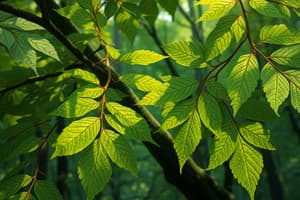Podcast
Questions and Answers
What is the primary goal of forest protection in silviculture?
What is the primary goal of forest protection in silviculture?
- To clear land for agriculture
- To safeguard forest resources (correct)
- To introduce exotic species
- To promote rapid deforestation
Which of the following describes afforestation?
Which of the following describes afforestation?
- Restoring forests to degraded areas
- Planting trees in areas without prior forest vegetation (correct)
- Converting forest land to urban development
- Removing existing forests for agricultural use
What differentiates reforestation from afforestation?
What differentiates reforestation from afforestation?
- Afforestation involves planting native trees only
- Reforestation is aimed at restoring previously cleared land (correct)
- Reforestation happens in areas without prior forest cover
- Afforestation can only occur in tropical regions
Which term refers to the transformation of habitable land into desert?
Which term refers to the transformation of habitable land into desert?
What is an exotic species?
What is an exotic species?
What does forest degradation primarily result in?
What does forest degradation primarily result in?
What is meant by watershed in environmental terms?
What is meant by watershed in environmental terms?
Which human activity is considered a direct cause of deforestation?
Which human activity is considered a direct cause of deforestation?
What is the minimum height a tree must reach to be considered part of a forest?
What is the minimum height a tree must reach to be considered part of a forest?
Which of the following is NOT a characteristic of a forest?
Which of the following is NOT a characteristic of a forest?
Which type of vegetation can be included in the definition of forests, provided it meets the necessary criteria?
Which type of vegetation can be included in the definition of forests, provided it meets the necessary criteria?
What is the minimum tree crown cover percentage required for land to be classified as a forest?
What is the minimum tree crown cover percentage required for land to be classified as a forest?
What kind of area, according to the forestry definition, can be included in forests?
What kind of area, according to the forestry definition, can be included in forests?
Which term describes an ecosystem with a dense and extensive tree cover that also includes meadows and streams?
Which term describes an ecosystem with a dense and extensive tree cover that also includes meadows and streams?
How large must an area be to be considered a forest based on land area criteria?
How large must an area be to be considered a forest based on land area criteria?
What defines the community aspect of a forest ecosystem?
What defines the community aspect of a forest ecosystem?
Flashcards are hidden until you start studying
Study Notes
Forest Conservation and Silviculture
- Forests are vital ecosystems known as life-giving, requiring conservation and protection.
- Silviculture involves the art and science of managing and caring for forest resources.
- Forest protection focuses on safeguarding forests from harmful practices and external threats.
Forest Land Use Changes
- Forest Clearing: Complete removal of natural forest to replace it with other land uses.
- Forest Degradation: Temporary or permanent loss of crown cover in forests, impacting their ability to provide ecosystem services.
- Afforestation: Planting trees in previously treeless areas to create new forests.
- Deforestation: The clearing of forests for commercial purposes, leading to conversion to non-forest uses, including agriculture and infrastructure.
- Direct causes of deforestation include natural events (hurricanes, fires) and human activities (agricultural expansion, logging, mining).
Environmental Issues
- Desertification: The process that transforms habitable land into desert, often due to climate change or poor land management practices.
- Reforestation: Reestablishing forests on previously cleared lands to restore ecosystems.
Ecological Terms
- Endemic Species: Native species restricted to a specific area, often remnants of wider distributions.
- Exotic Species: Plants introduced outside their natural range, which can impact local ecosystems.
- Natural Resources: Material assets provided by ecosystems.
Protected Areas and Vegetation Types
- Protected Areas: Designated lands and waters set aside for their unique biological significance, managed to enhance biodiversity.
- Shrubs: Woody perennials with multiple stems that are low-growing compared to trees.
- Trees: Woody plants with a defined stem and a height of at least 10 feet, important for many ecological functions.
- Vegetation: The collective plant life in a region, contributing to ecosystem health and stability.
Watershed Definition
- A watershed encompasses the entire geographical area drained by a river and its tributaries, crucial for water supply and environmental management.
Understanding Forests
- Forests: Communities characterized by dense tree cover, which serve as ecosystems providing food, shelter, and recreational opportunities.
- Defined by presence of tree species, age classes, and varying structures, forests can include meadows and water bodies.
- Land considered a forest must meet specific criteria: more than 0.5 hectares, tree crown cover exceeding 10%, and trees reaching a height of at least 5 meters at maturity.
Forest Production and Management
- Forests are managed to produce timber and other resources, while also serving indirect benefits such as watershed protection and recreation.
- Definition of forests includes young stands and plantations not yet meeting canopy cover standards, indicating the importance of sustainable forest management practices.
Studying That Suits You
Use AI to generate personalized quizzes and flashcards to suit your learning preferences.




